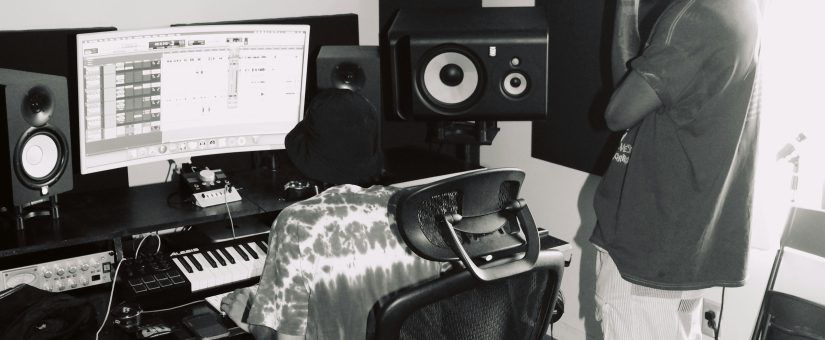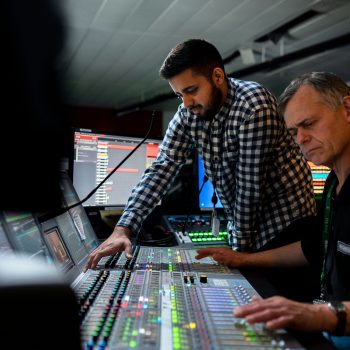
How do I Find a Record Producer?
Finding the right music producer is one of the most important decisions an artist or band can make in their music career. The right producer can take a raw song or concept and transform it into a professional, polished sound that resonates with listeners. However, the process of finding a good music producer is not as simple as just looking for someone with technical skills—it involves a combination of artistry, personal chemistry, and business considerations.
In this comprehensive guide, we will discuss how to find a music producer who aligns with your artistic vision and can help you achieve your musical goals. We’ll break the process down into several key steps: understanding what a music producer does, identifying your musical needs, finding potential producers, evaluating their work, approaching them, and establishing a professional relationship. By the end of this guide, you’ll have a better idea of how to approach this crucial step in your music career.
1. Understanding the Role of a Music Producer
Before you begin searching for a music producer, it’s important to understand what a producer actually does. While it’s easy to confuse a music producer with an engineer or sound technician, the producer’s role is far broader. A music producer can wear many hats, and their responsibilities may vary depending on the project, genre, and style. However, some common tasks a music producer typically handles include:
- Creative Direction: The producer often plays a key role in shaping the overall sound and feel of a song or album. This can include suggesting arrangements, chord changes, and even lyrical revisions.
- Song Development: Producers help develop the musical ideas you bring to the table, helping to structure songs, refine melodies, and create a cohesive project.
- Sound Design: They may help create or select sounds, instruments, and arrangements that give the track its signature sound. This is especially important in genres like electronic music, hip-hop, or pop.
- Studio Management: A producer often oversees the recording process, including hiring session musicians, managing time in the studio, and directing the engineer.
- Post-production and Mixing: After the recording phase, producers may oversee or directly manage mixing and mastering to ensure the track has the right balance and sonic qualities.
- Collaborative Effort: The best producers act as collaborators, helping to bring out the best in the artist’s performances and ideas, rather than imposing their own vision on the music.
Given these responsibilities, it’s clear that finding a producer with the right skill set and vision for your music is vital. The next step is to determine your musical needs and identify what kind of producer you are looking for.
2. Identifying Your Musical Needs
Before you start searching for producers, it’s essential to clarify what you want from the collaboration. Different producers specialize in different aspects of music, so you need to determine which skills are most important for your project.
- Genre Specialization: Some producers specialize in specific genres of music—hip-hop, rock, electronic, pop, jazz, etc. For example, a producer known for their work in indie rock may not be the best fit for a heavy metal album or a dance-pop track. Understanding which genre-specific expertise you need can help narrow down your search.
- Budget Considerations: Music production can be expensive, and there are different price ranges depending on the experience and reputation of the producer. If you are working with a limited budget, you may need to consider producers who are less established or offer a package deal that fits your budget.
- Project Scope: Are you looking to produce a full album, a single, or just a demo? The size and complexity of your project will affect the type of producer you need. Some producers excel at creating full-length albums, while others may focus more on singles or one-off tracks.
- Experience Level: Are you looking for a well-known, high-profile producer with a proven track record? Or would you prefer to work with someone emerging who can give more personal attention to your project? Both have their advantages and disadvantages. Established producers may bring a wealth of experience and industry connections, but up-and-coming producers may offer fresh ideas and a more collaborative working relationship.
Once you have a clear understanding of your own needs, you can start the search for producers who are a good fit.
3. Finding Potential Producers
Once you’ve identified your musical and financial requirements, it’s time to begin finding potential producers. There are several ways to locate music producers, both online and offline.
A. Online Platforms and Websites
The internet has made it easier than ever to connect with music producers, regardless of where they are located in the world. Here are some online resources that can help:
- SoundBetter: A platform where you can search for producers, mixers, and mastering engineers. You can view their portfolios, read client reviews, and contact them directly.
- Splice: Primarily known as a sample platform, Splice also allows producers to collaborate on tracks and find session musicians. It’s a great place to find up-and-coming producers, particularly for electronic music.
- BeatStars: If you’re in the hip-hop or R&B genre, BeatStars is a great platform to find producers who specialize in those styles. You can browse beats, listen to their work, and contact producers directly.
- LinkedIn: Many professional music producers maintain profiles on LinkedIn. You can use the platform to search for producers, check out their experience and credentials, and reach out for a conversation.
- YouTube and SoundCloud: Many producers showcase their work on platforms like YouTube and SoundCloud. By listening to their previous tracks, you can get a feel for their style and approach.
- Music Forums and Communities: Websites like Gearslutz (now called Gearspace) and Reddit’s /r/WeAreTheMusicMakers have dedicated communities where you can find producers, engineers, and collaborators. These platforms can also provide feedback on producers and allow you to connect with like-minded musicians.
B. Networking and Word of Mouth
Personal recommendations from fellow musicians, industry professionals, or friends can be a great way to find a trusted producer. Networking is often one of the best ways to find a producer who is both skilled and a good fit for your personality.
- Music Events and Conferences: Industry events like South by Southwest (SXSW), NAMM, or even smaller local shows and festivals can be great places to meet producers face-to-face.
- Studio Visits: Visiting recording studios can give you a chance to meet in-house producers and engineers. Many studios will have a roster of in-house producers that you can work with.
- Other Musicians: Reach out to fellow musicians whose work you admire. They may have worked with a producer you might like or can point you in the direction of someone with the right expertise.
C. Social Media
Social media platforms like Instagram, Facebook, Twitter, and TikTok have become essential tools for musicians and producers alike. Many producers post content on their profiles that highlights their skills, so you can get a sense of their style and approach before contacting them.
- Instagram: Many producers share snippets of their beats, tracks, and behind-the-scenes studio work on Instagram.
- Twitter: Producers and musicians often use Twitter to connect, so keep an eye out for posts related to music production and collaborations.
- TikTok: Some producers have found success on TikTok by sharing quick production tips, studio tours, or viral trends, which can be a great way to find fresh talent.
D. Local Talent
If you prefer to work in person, local talent is always a good option. This could involve:
- Local Music Schools: Many producers are students or recent graduates of music production programs. Universities or conservatories often have job boards or internship programs where you can connect with students looking for experience.
- Local Music Venues and Studios: Check out local music venues, festivals, or studios that host events for producers, bands, and artists. These can be great places to meet potential collaborators.
4. Evaluating Potential Producers
Once you’ve identified some potential producers, the next step is evaluating their fit for your project. Here are some key considerations when evaluating a producer:
A. Listen to Their Previous Work
The most important thing to evaluate when choosing a producer is their previous work. Make sure to listen to their portfolio of songs and albums to get a sense of their style and quality. Look for producers who have worked in your genre or who have a sound that resonates with what you’re looking for.
B. Communication and Collaboration Style
Once you’ve found a producer whose sound you like, it’s time to assess their communication and collaboration style. The best collaborations are built on mutual respect and open communication, so it’s essential that the producer is easy to work with. You should feel comfortable discussing your ideas and receiving feedback. Be sure to:
- Have a conversation about the vision for your project and see if their approach aligns with your goals.
- Discuss how they like to work in the studio (e.g., do they have a hands-on approach, or do they prefer to let artists experiment on their own?).
- Assess whether they listen to your ideas and respect your input while offering their expertise.
C. Technical Skills and Experience
A producer’s technical skills are essential, particularly when it comes to mixing, mastering, and ensuring the technical quality of your music. Make sure they have the technical know-how to take your music to the next level. If possible, try to observe them in action or ask about their experience with certain production tools and software (Pro Tools, Ableton, Logic, etc.).
D. Chemistry
Sometimes, the most crucial factor in a successful collaboration is personal chemistry. If you’re not comfortable with the producer or don’t share similar values, it can affect the quality of the work and the overall experience. It’s essential to find someone you can trust and who believes in your vision.
5. Approaching a Producer
Once you’ve found a producer or two that seem like a good fit, it’s time to approach them. Here are a few tips for reaching out:
A. Be Professional and Clear
When you first contact a producer, be clear about your intentions, what you’re looking for, and what you expect from the collaboration. Be concise but thorough, and always remain professional in your communication.
B. Share Your Music
If possible, share a few demo tracks with the producer so they can get a sense of your sound and style. Don’t just send a one-off clip—send a couple of songs to give them a better idea of your work.
C. Discuss Budget and Terms
Be upfront about your budget and any potential financial constraints. Music production is a business transaction, so it’s important to discuss payment terms, rates, and any other relevant details (e.g., ownership of the final product, royalties, etc.).
D. Meet in Person or Have a Video Call
If you can, arrange an in-person meeting or video call to discuss the project further. This can help establish rapport and give you both an opportunity to assess whether you’ll work well together.
6. Establishing a Professional Relationship
Once you’ve selected a producer, you’ll need to formalize your working relationship. This typically involves a contract or agreement that outlines:
- Payment terms
- Royalty splits (if applicable)
- Timeline and deadlines
- Rights and ownership of the music
- Work expectations
It’s always a good idea to have a written agreement to avoid any potential misunderstandings down the line.
Conclusion
Finding the right music producer is a crucial step in the development of your sound and your music career. By carefully evaluating your needs, searching for the right producer, and building a strong working relationship, you can ensure that your music reaches its full potential. Take your time, do your research, and trust your instincts—the right producer can make all the difference in turning your musical vision into reality.
- On 01/29/2025


